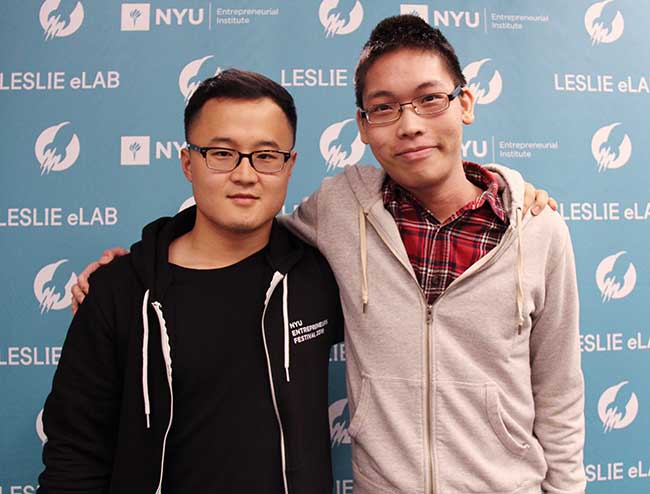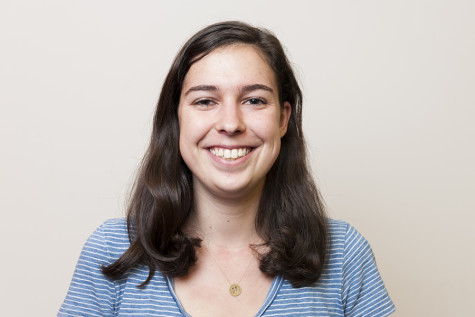NYU Startup Makes Tattoos Commitment-Free
CEO Seung Shin and Senior R&D Researcher Seung Anthony Lam started Ephemeral to provide tattoos without the commitment.
April 18, 2016
For one team of NYU students and grads, tattoos are more than a symbol of rebellion — they are a business.
The company, called Ephemeral, developed a tattoo ink that won’t last forever — just for a year or two. And if you change your mind before the art fades, there’s also a quick and easy way to remove your tattoo.
The original idea came to Seung Shin, Ephemeral’s CEO, while he was still studying Chemical and Biomolecular Engineering at the Tandon School of Engineering. Although he’s always been interested in tattoos, he’d been apprehensive about getting
one himself.
“I come from a traditional Asian family, so my parents despise tattoos,” Shin said. But in 2014, he took the plunge.
“I thought, ‘I’m a college guy, I’m an adult,’ so I decided to get a tattoo anyway,” he said. When he went home, his parents weren’t happy with the new decoration on their son’s bicep, and convinced him to get it removed.
As Shin discovered, laser tattoo removal can be painful, expensive and also has no guarantee of completely getting rid of the design. Complete tattoo removal can take up to ten sessions. Shin only went to one, returning to school with his tattoo and a new business concept.
He pitched the idea to some of his fellow chemical and biomolecular engineering students at Tandon — Brennal Pierre, Vandan Shah and Anthony Lam — and started work on creating a new kind of tattoo.
Traditional tattoos last forever because the ink is made of very large molecules. Macrophages, the cells your immune system uses to get rid of stuff like bacteria, just can’t break down the huge dye molecules.
Ephemeral uses a different approach. Lam, another of Ephemeral’s co-founders and the company’s Senior R&D Researcher, said that each dye molecule in their ink is small but it’s encased in a special capsule.
“The reason it’s encapsulated is so that it stays in the skin, so the macrophages can’t eat it up,” Lam said.
These capsules protect the ink from your immune system, but they also can easily be dissolved by a removal solution that Ephemeral has developed. If you decided you no longer want an Ephemeral tattoo, an artist would simply retrace the design with a tattoo gun loaded with the removal solution.
Even if you don’t decide to use the removal solution, the capsules protecting the ink will eventually break, and your tattoo will disappear. Unlike traditional inks which are often made of heavy metals, Ephemeral’s formula is made up organic compounds that can safely be absorbed by your body.
With the help of Josh Sakhai, the company’s CFO and a sophomore studying in both Stern and CAS, the Ephemeral team won first place in the Technology Venture category of last year’s W. R. Berkley Innovation Lab $200K Entrepreneurs Challenge. Just last month, the company was also awarded the title of “Coolest College Startup” by Inc.com.
Sakhai has high hopes for Ephemeral’s future.
“Five years down the road, I hope we’ve substantially dented the tattoo industry, its culture and its future,” he said. “I hope to see a lot more people with ink.”
Shin, Ephemeral’s CEO, is planning to be one of those people despite his negative experience with his first tattoo.
“I already have plans for two full sleeves,” he said. “I’m gonna be decked out.”
A version of this story appeared in the Monday, April 18 print edition. Email Kendall Levison at [email protected].

















































































































































Henry Bloom • May 25, 2016 at 7:14 pm
Love to see the science behind it
Henry Bloom • May 25, 2016 at 7:14 pm
Great concept if it works! Love to see the science behind it.
Wanda Sevon • May 3, 2016 at 12:46 pm
This message is intended for:Seung Shin. I live in Chicago and read about your permanent Ephemeral ink system that allows wearers to remove their tattooing, and would like to know if it could be used for myself I have had my eyes underlined and the gal did it in Florida two years ago and she did a terrible job the one line on my eye is fading and the other liner is very crooked!! (A terrible job!!) So my question to you is simply this,Can this tattooing be removed on account it is liner under my eye and I need to know if the solution would be safe to use by the eye area? Could you please respond and let me know if this would be possible? Please answer and I sincerely thank you much! Wanda Sevon
J. Carmichael • Apr 18, 2016 at 5:01 pm
Great idea but i’d like to see some proof that it works before I try it. And, most importantly, good luck finding a tattoo artist to use this ink! Artists spend years honing their craft only to see if fade away in two years? I don’t think so. It didn’t work for Freedom ink.